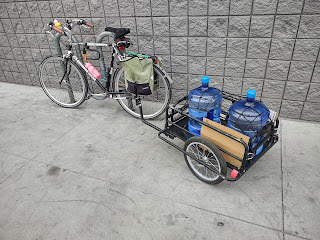The Toolbox vs. The Swiss-Army Knife

One thing that I think is often overlooked in discussions around urban mobility and alternative transportation is that the car is a truly versatile transportation tool. If you have a well-maintained car in your garage, you can decide, on a moment's notice, to travel any distance, from around the block to across the country, and you can generally expect to find maintained high-speed roads going direct from where you are to where you want to be. The car is a Swiss Army knife of transportation, a tool for any purpose. If you have one, you probably don't even think about using anything else to get around, and this results in a common response to proposals to diminish cars' presence in our lives-- "You can't seriously expect everyone to ride a bike/take the bus/walk/etc. everywhere ." And you're right! I can't! There are a lot of reasons why a particular mode might be unsuitable for a particular trip. In Las Vegas, for example, summer heat can often be in
.jpeg)